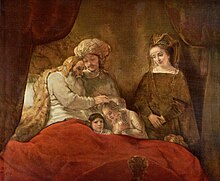Manasseh (tribal patriarch)
Asenath was an Egyptian woman whom the Pharaoh gave to Joseph as wife, and the daughter of Potipherah, a priest of On (Genesis 41:50–52).
Biblical scholars regard it as obvious, from their geographic overlap and their treatment in older passages, that originally Manasseh and Ephraim were considered one tribe—that of Joseph.
[8][9] Near the end of the book of Genesis, in some English translations of the Bible (e.g., the King James Version), Manasseh's grandchildren are described as having been "brought up upon Joseph's knees".
[12][13] The text describing this blessing features a hapax legomenon: the Biblical Hebrew word שכל (sh-k-l), which Rabbinic literature interpreted esoterically;[14] Some Rabbinic sources connect the term with sekhel (Hebrew: שֵׂכֶל, 'intellect' or 'wit') and view it as indicating that Jacob was entirely aware of who he was actually blessing.
[14] Other sources connect the term with shikkel, viewing it as signifying that Jacob was actually despoiling Manasseh in favour of Ephraim.
[15] Despite the absence of any credible evidence these theories still garner support from some fundamentalist Christians, e.g., the Philadelphia Church of God (pcg.church).
